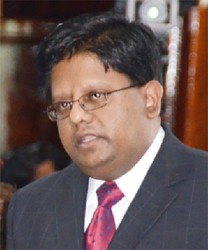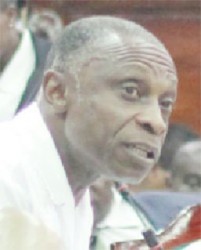Finance Minster Dr. Ashni Singh has demonstrated a “misunderstanding” of the operation of the Consolidated Fund, according to Carl Greenidge, who says government is legally bound to account for payouts of proceeds from two Inter-American Development Bank (IDB) loans, totaling US$32 million, which were recently deposited into the fund.
Greenidge in March filed writs in the High Court seeking declarations that the proceeds of the two loans, a US$15 million security loan and a US$17.1 million environmental loan, must be paid into the Consolidated Fund of Guyana and that there must be no withdrawal of these proceeds except by appropriation under Article 217 of the Constitution.
He also asked for a declaration that Singh cannot lawfully spend the monies from the loans unless authorized by the National Assembly. And in addition to a conservatory order to prevent access to the funds, he has also sought an order that the minister or any delegates account for any expenditure pending the hearing and determination of the matter.

Singh, in response to the writ, has argued that if the court moves to restrict government’s access to the loans, it would be violating the separation of powers doctrine. Singh also indicated that the money was deposited into the fund over three weeks prior to the court action and therefore the reliefs being sought by Greenidge were “irrelevant and wholly unwarranted.”
However, Greenidge, in his affidavit of response, filed by his attorney Roysdale Forde, contends that Singh has misdirected himself on the operation of the fund in light of the minister’s submission that once the loan disbursement is received, as a matter of routine it is then paid into the fund and forms part of the “fungible, comingled, and internally indistinguishable pool of resources….”
According to Greenidge, who is a former Finance Minister, the loan agreements included stipulations that the borrower set up a special bank account for the deposit of the money. Further, while Singh has said withdrawing proceeds of the loans is indistinguishable from the withdrawal of any other sums that form part of the fund, Greenidge points out that the loan agreements also call for the borrower to agree to maintain separate accounting records, and an adequate internal control system, as well as maintain appropriate systems of internal accounting and administrative controls. Additionally, he says the agreements call for the accounting system to be organised so as to provide the necessary documentation to permit the verification of transactions and facilitate the timely preparation of financial statements and reports.

Greenidge has advanced that such transactions would necessarily include payments out of the proceeds of the loans and that compliance with the loan agreements not only permit but require that withdrawals be separately accounted for.
‘Indistinguishable’
Singh, in his response to Greenidge’s original filings, had described the two loans as “single-tranche loans” that are disbursable in a lump sum upon compliance by the borrower with specified policy conditions. They are known in the development financing industry as “policy-based loans” or “policy-based programmatic loans.”
He further noted that the environmental loan is the second of a two-operation programmatic policy-based loan directed at strengthening the environmental sector in Guyana. “As a matter of routine practice, once the borrower has complied with the stipulated conditions, the tranche is fully disbursed to the borrower and the borrower applies the proceeds of the loan in accordance with local laws and regulations,” he argued. The loan agreement, having been signed on February 19th, 2015 and Guyana having already complied with the conditions precedent to the single and only tranche, Singh said the proceeds of the loan were fully disbursed by the IDB with value date February 23rd, 2015, and received by the Bank of Guyana on February 24th, 2015 and credited to the Consolidated Fund on that same day.
After the previous hearing on April 15th, Attorney General (AG) Anil Nandlall, who along with Singh are listed as the defendants in the case, had said in a press statement that withdrawing the proceeds of the loans from the Consolidated Fund is indistinguishable from the withdrawal of any other sums that form part of that Consolidated Fund.
Furthermore, Nandlall said that when sums are deposited into the Consolidated Fund, whether they are proceeds of policy based loans or tax or non-tax revenues collected) “they do not sit in the said Fund with a specific earmarked intended future use. Instead they form part of the general pool of resources that make up that Fund.”
According to the AG, there are no requirements in law or emerging from the terms and conditions of the loan contract concerned that the proceeds of the loan be separately identified when withdrawn from the Consolidated Fund or imposing any restriction whatsoever that the said proceeds when withdrawn be used for any particular earmarked or stipulated purpose. He said when sums are withdrawn from the Consolidated Fund, they are drawn from the same general pool of resources, “their original source remaining unknown and irrelevant. In other words, in any one month funds are withdrawn and spent from the Consolidated Fund to meet the operations of Government, without any identification being made of the original source of those Funds.”Further, he said the provisions imposing restrictions on withdrawals from the Consolidated Fund and expenditure therefrom are applicable to the fund as a whole and cannot be applied to subsets or subparts of the fund.
In his original affidavit, Greenidge listed a series of concerns, including that the 10th Parliament has been dissolved without an Appropriation Act being approved in relation to the IDB loans. He also cited Parliament’s disapproval last year of budget funds for the Low Carbon Development Programme, which is to benefit from the proceeds of the IDB environmental loan in question.
He said he feared that Singh will spend the sums unless prohibited by the court.
He then cited a series of actions by Singh which he said led him to be fearful of this. These actions included the spending by Singh of $4.5 billion last year which the High Court recently ruled had been illegitimate. He also cited the conduct of government holding company NICIL, of which Singh is part, over its expenditures. Greenidge also referenced a complaint which had been lodged against Singh with the Institute of Chartered Accountants of Guyana.
At an April 2nd hearing, the acting Chief Justice Ian Chang granted an interim order that has effectively prevented the government from accessing the funds until the case is fully heard and determined.
The matter continues on May 8th, when the government is expected to file its affidavit of rejoinder in response to Greenidge’s submissions.




